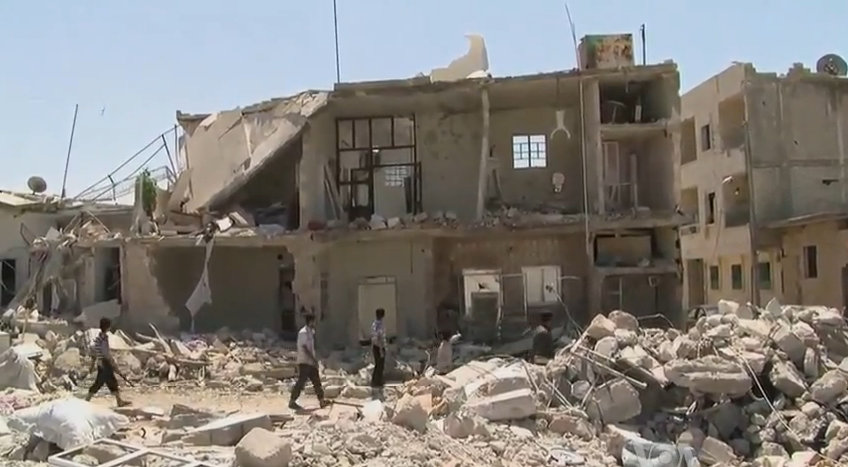“Precise and proportionate,” is how Secretary of Defense James Mattis described the recent shower of missiles that fell on three targets in Syria. Precise, possibly, although anyone who has dealt with them knows that smart weapons often do dumb things. But proportionate? On that one we should trust the words of poets, not generals:
Avenge! No such revenge – revenge for
the blood of a little child – has yet been
devised by Satan.
Thus wrote Chaim Nahman Bialik after the Kishinev massacre of 1905. Proportionality, in this case, would require asphyxiating Bashar al-Assad’s children slowly with chlorine gas, and making sure that the world knows about it. We do not do such things.
What did we do, instead? “We believe that by hitting Barzeh in particular we’ve attacked the heart of the Syrian chemicals weapon program,” said the director of the Joint Staff. Parse those words: “we believe” (not, “we know”); “we’ve attacked” (not, “we’ve destroyed”: throwing a rock counts as an attack); “the heart of the Syrian chemical weapons program” (not their stockpiles, not their scientists, not their decision-makers, not their munitions handlers, not their pilots, not even necessarily all or even most of their laboratories). Military people know, none better, how to be precise when they wish to be. The art of command rests in part on accuracy and concreteness. The Pentagon’s language here tells you that the generals know better, but that they are being molded by the American President.
This attack was unserious but intended to relieve emotional pressure, a kind of martial onanism masquerading as strategy. Its effects can be compared to the police coming upon a mass murderer, cited multiple times for firearms violations, reloading his AR-15 in the midst of a massacre. The cops step past the twitching bodies, take the weapon, eject the 30-round magazine, take out half a dozen bullets, and return the remainder and the weapon to the murderer with a stern look. They then swagger back to the squad room shouting, “Showed him, didn’t we!”
In this case it would have been air attacks to smash the Syrian air-defense system, destroy helicopters and aircraft, and above all kill a good number of the men who conducted these attacks and the men who ordered them. It would probably have killed some Russians, Iranians, and Hezbollah militia members too. Not proportionality, even then, but something closer to justice, and more importantly, a use of force with a sound strategic purpose.
That would be hazardous in a number of ways, particularly vis-à-vis the Russians. But as it is, Vladimir Putin has yet another piece of evidence that President Donald Trump will steer away from a direct confrontation with him, even though, in any kind of military conflict in the Middle East it would be the Russians, not the Americans, who by far would have the worst of it. He would secretly fear a president who would do that, because he knows that military humiliation has provoked the downfall of more than one Czar in the past. So message received: The American enemy will posture and thump his chest, but is afraid to actually stand up to you, even though his air force could blow yours out of the sky and his navy sink yours to the bottom of the sea.
The magnitude of the Syrian debacle is difficult to absorb. Half a million dead. Millions more refugees. Ancient cities in ruins. The politics of the region and even Europe destabilized. Norms about the use of chemical weapons shattered. Iranian influence extended into the Levant, and Russia’s ability to meddle and inflame exacerbated. Sunni Islamist extremists suppressed only for now, but hundreds of thousands of potential recruits for future jihad waiting in the smashed cities and desolate refugee camps. A much larger regional war brewing and indeed in its early stages. And there is not the slightest evidence of an American policy concept to deal with that.
To be fair, the Trump administration inherited this disaster from the Obama administration, whose inattention, self-deception, and fecklessness permitted this catastrophe to mature. The Trump administration is not the first to boast that it has drawn the poisoned fang of Assad’s chemical weapons. It is not the first to preen about a red line and then walk away from it and pretend that it has not. Nor is it, yet, the first through its evident eagerness to leave the Middle East, ready to make things worse. It is not the first administration to insist that the only alternative to what they are doing (and not doing) is an invasion with 150,000 troops, a false choice and profoundly dishonest argument. And like its predecessor, when cornered in a policy debate it is reduced to screaming “Iraq!” and pointing a trembling finger at George W. Bush. The architects of the Obama policy in Syria have nothing to reproach their successors with.
It is all profoundly unserious, which is why it is altogether fitting that Alex Jones of Infowars fame broke down in tears at the betrayal—as he understood it—of the president ordering a few missiles to fly at Syrian buildings. This is, apparently, a breach of faith in Trump Land. In the place of serious foreign-policy debate we have not theater, but a kind of cartoon show, in which America’s military leaders have voiceovers, but the protagonists most resemble Homer Simpson or Beavis and Butthead. It is altogether pathetic and dispiriting, and will do the suffering people of Syria and American national interest no good at all.

